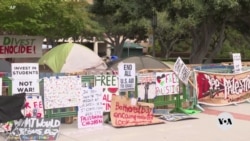Student Union
Femen Founder Oksana Shachko Dead In Paris In Suspected Suicide
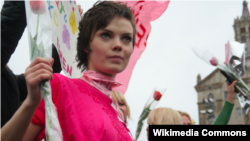
A founding member of the prominent protest group Femen, Oksana Shachko, has died in Paris in an apparent suicide, fellow members say.
"RIP. The most fearless and vulnerable Oksana Shachko has left us," a post on the Femen website said. "We mourn together with her relatives and friends and [await] the official version from the police."
"At the moment it is known that ... July 23, Oksana’s body was found in her apartment in Paris. According to her friends, she left a suicide note," the post said.
"As far as I know, she was concerned that everything is going badly in the world," Femen co-founder Anna Hutsol told RFE/RL's Ukrainian Service on July 24.
The second secretary at the Ukrainian Embassy in Paris, Oksana Lovha, confirmed Shachko's death to Current Time TV, the Russian-language network run by RFE/RL in cooperation with VOA.
There was no public comment from French authorities, and Lovha said Ukrainian diplomats were awaiting further details from police.
Founded in Ukraine a decade ago, Femen is known mainly for protests in which activists often bare their breasts -- sometimes exposing slogans written on their skin -- and disrupt political events or gatherings.
Femen activists have rushed politicians such as Russian President Vladimir Putin and Czech President Milos Zeman, and public figures like American comic Bill Cosby.
Often directed at leaders they describe as dictators or oppressors, their protests have also taken other forms and targeted issues such as the environment.
A native of Ukraine who had lived in Paris in recent years, Shachko, 31, was one of a group of Femen activists who rushed Putin and German Chancellor Angela Merkel in Hannover, Germany, in 2013.
"Oksana fought against injustice, fought for equality, fought like a hero for herself and for other women," said a post on the Femen website said.
"Oksana is no longer with us, but she is here, she is everywhere," it said. "Oksana ... is in each of us, she is in FEMEN, and she is in the history of feminism."
Femen said in 2011 that Shachko was among three members seized by security officers after staging a topless protest mocking Belarusian President Alyaksandr Lukashenka.
It said the officers forced them to strip naked, poured oil over them, threatened to set them on fire, and cut off their hair.
Femen has said that Shachko was abducted again during a visit by Putin to Ukraine, and a lawyer for the group said she was beaten and briefly hospitalized.
Femen now has branches on at least four continents.
BBC contributed to this report.
See all News Updates of the Day
Pro-Palestinian protesters break through barricades to retake MIT encampment

Pro-Palestinian protesters who had been blocked by police from accessing an encampment at the Massachusetts Institute of Technology on Monday broke through fencing, linked arms and encircled tents that remained there, as Columbia University canceled its university-wide commencement ceremony following weeks of pro-Palestinian protests.
Sam Ihns, a graduate student at MIT studying mechanical engineering and a member of MIT Jews for a Ceasefire, said the group has been at the encampment for the past two weeks and that they were calling for an end to the killing of thousands of people in Gaza.
"Specifically, our encampment is protesting MIT's direct research ties to the Israeli Ministry of Defense," he said.
Protesters also sat in the middle of Massachusetts Avenue, blocking the street during rush hour in the Boston area.
The demonstrations at Columbia have roiled its campus and officials said Monday that while it won't hold it's main ceremony, students will be able to celebrate at a series of smaller, school-based ceremonies this week and next.
The decision comes as universities around the country wrangle with how to handle commencements for students whose high school graduations were derailed by COVID-19 in 2020. Another campus shaken by protests, Emory University, announced Monday that it would move its commencement from its Atlanta campus to a suburban arena. Others, including the University of Michigan, Indiana University and Northeastern, have pulled off ceremonies with few disruptions.
Columbia's decision to cancel its main ceremonies scheduled for May 15 saves its president, Minouche Shafik, from having to deliver a commencement address in the same part of campus where police dismantled a protest encampment last week. The Ivy League school in upper Manhattan said it made the decision after discussions with students.
"Our students emphasized that these smaller-scale, school-based celebrations are most meaningful to them and their families," officials said.
Most of the ceremonies that had been scheduled for the south lawn of the main campus, where encampments were taken down last week, will take place about 8 kilometers (5 miles) north at Columbia's sports complex, officials said.
Speakers at some of Columbia's still-scheduled graduation ceremonies include Pulitzer Prize-winning playwright James Ijames and Dr. Monica Bertagnolli, director of the National Institutes of Health.
Columbia had already canceled in-person classes. More than 200 pro-Palestinian demonstrators who had camped out on Columbia's green or occupied an academic building were arrested in recent weeks.
Similar encampments sprouted up elsewhere as universities struggled with where to draw the line between allowing free expression while maintaining safe and inclusive campuses.
The University of Southern California earlier canceled its main graduation ceremony. Students abandoned their camp at USC on Sunday after being surrounded by police and threatened with arrest.
Other universities have held graduation ceremonies with beefed-up security. The University of Michigan's ceremony was interrupted by chanting a few times Saturday. In Boston on Sunday, some students waved small Palestinian or Israeli flags at Northeastern University's commencement in Fenway Park.
Emory's ceremonies scheduled for May 13 will be held at the GasSouth Arena and Convocation Center in Duluth, almost 20 miles (30 kilometers) northeast of the university's Atlanta campus, President Gregory Fenves said in an open letter.
"Please know that this decision was not taken lightly," Fenves wrote. "It was made in close consultation with the Emory Police Department, security advisors and other agencies — each of which advised against holding commencement events on our campuses."
The 16,000-student university is one of many that has seen repeated protests stemming from the conflict that started Oct. 7 when Hamas militants attacked southern Israel, killing about 1,200 people, mostly civilians, and taking roughly 250 hostages. Student protesters are calling on their schools to divest from companies that do business with Israel or otherwise contribute to the war effort.
Vowing to destroy Hamas, Israel launched an offensive in Gaza that has killed more than 34,500 Palestinians, about two-thirds of them women and children, according to the Health Ministry in the Hamas-ruled territory. Israeli strikes have devastated the enclave and displaced most of its inhabitants.
Hamas on Monday announced its acceptance of an Egyptian-Qatari cease-fire proposal, but Israel said the deal did not meet its "core demands" and that it was pushing ahead with an assault on the southern Gaza town of Rafah.
"Cease-fires are temporary," said Selina Al-Shihabi, a Georgetown University sophomore who was taking part in a protest at George Washington. "There can be a cease-fire, but the U.S. government will continue to arm the Israeli military. We plan to be here until the university divests or until they drag us out of here."
At the University of California, San Diego, police cleared an encampment and arrested more than 64 people, including 40 students.
The University of California, Los Angeles, moved all classes online for the entire week due to ongoing disruptions following the dismantling of an encampment last week. The university police force reported 44 arrests but there were no specific details, UCLA spokesperson Eddie North-Hager said in an email to The Associated Press.
Schools are trying various tactics from appeasement to threats of disciplinary action to get protestors to take down encampments or move to campus areas where demonstrations would be less intrusive.
The School of the Art Institute of Chicago said in a Facebook post Sunday that it offered protesters "amnesty from academic sanction and trespassing charges" if they moved.
"Many protesters left the premises of their own accord after being notified by the police that they were trespassing and subject to arrest," the school said. "Those that remained were arrested after multiple warnings to leave, including some of whom we recognized as SAIC students."
A group of faculty and staff members at University of North Carolina at Chapel Hill asked the administration for amnesty for any students who were arrested and suspended during recent protests. UNC Faculty and Staff for Justice in Palestine said in a media advisory that it would deliver a letter on behalf of more than 500 faculty who support the student activists.
Other universities took a different approach.
Harvard University's interim president, Alan Garber, warned students that those participating in a pro-Palestinian encampment in Harvard Yard could face "involuntary leave." That means they would not be allowed on campus, could lose their student housing and may not be able to take exams, Garber said.
Columbia University cancels main commencement after protests that roiled campus for weeks
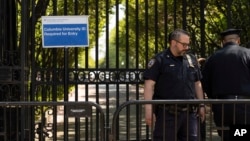
Columbia University is canceling its large university-wide commencement ceremony amid ongoing pro-Palestinian protests but will hold smaller school-based ceremonies this week and next, the university announced Monday.
"Based on feedback from our students, we have decided to focus attention on our Class Days and school-level graduation ceremonies, where students are honored individually alongside their peers, and to forego the university-wide ceremony that is scheduled for May 15," Columbia officials said in a statement.
The protests stem from the conflict that started Oct. 7 when Hamas militants attacked southern Israel, killing about 1,200 people, mostly civilians, and taking roughly 250 hostages. Vowing to destroy Hamas, Israel launched an offensive in Gaza that has killed more than 34,500 Palestinians, about two-thirds of them women and children, according to the Health Ministry in the Hamas-ruled territory. Israeli strikes have devastated the enclave and displaced most of its inhabitants.
The University of Southern California earlier canceled its main graduation ceremony while allowing other commencement activities to continue.
- By VOA News
Where Are Pro-Palestinian Campus Protests Happening?
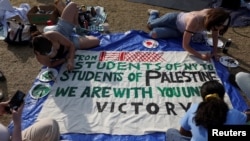
Colleges in the U.S. have been rocked by a wave of campus protests calling for an end to the war in Gaza, and for U.S. colleges to divest from Israel.
The Wall Street Journal’s Steven Russolillo rounds up some of the most important ones. (April 2024)
Pro-Palestinian protests in US could impact 2024 election
Despite the fact that many of their encampments at university campuses have been dismantled, pro-Palestinian demonstrators in the United States are standing their ground. If the protests continue, some analysts say they could have an impact on the 2024 presidential election. VOA’s Veronica Balderas Iglesias explains.
- By VOA News
Pro-Palestinian protest ends quietly at University of Southern California
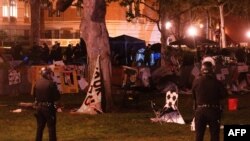
Pro-Palestinian protesters at an encampment at the University of Southern California, one of the focal points of anti-Israel protests across U.S. college campuses, left the scene early Sunday after authorities warned them that they could be arrested.
Their departure came after university safety officers and Los Angeles police began clearing the center of campus, where police had arrested 93 people on April 24.
"If you are in the center of campus, please leave,” the university warned the protesters on the social media platform X, saying they could be arrested if they stayed.
Elsewhere, pro-Palestinian protests continued at several college graduation ceremonies on Saturday.
At the University of Virginia, 25 people were arrested for trespassing after police clashed with pro-Palestinian protesters who refused to remove tents from the campus.
At the University of Michigan, demonstrators chanted anti-war messages and waved flags during graduation ceremonies. More protests occurred at Indiana University, Ohio State University, Princeton University in New Jersey and Northeastern University in Massachusetts.





